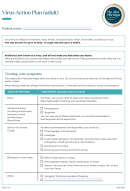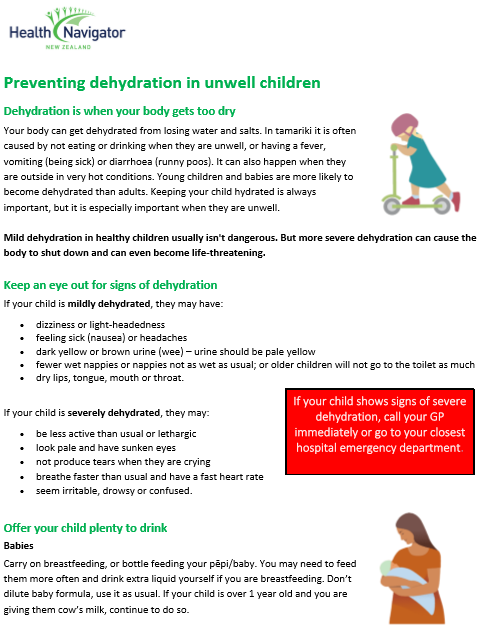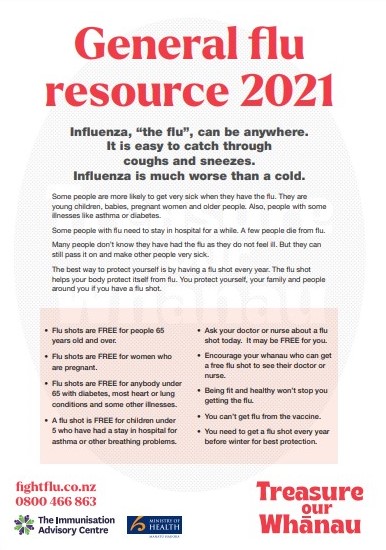You can now add Healthify as a preferred source on Google. Click here to see us when you search Google.
Flu and influenza-like illnesses
Sometimes also known as ILI (influenza-like illnesses)
Key points about influenza
- The flu (influenza) is a viral infection. Most people recover within a week or two, but it can cause serious illness in some people.
- Symptoms of flu (and COVID-19) can include a cough, a high temperature, shortness of breath, a sore throat, sneezing, a runny or congested nose, fatigue and upset stomach. If you have any of these, test for COVID-19.
- Vaccination is your best protection against flu.

Influenza, or the flu, is a viral infection. You can catch the flu by breathing in droplets that have been talked, sneezed, coughed or laughed into the air by a person with the flu.
Symptoms of flu can include a cough, a high temperature, shortness of breath, a sore throat, sneezing, a runny or congested nose, fatigue and upset stomach. If you have any of these, you should test for COVID-19 which can cause similar symptoms.
Most people recover from the flu within a week or two, but it can cause serious illness in some people. Vaccination is your best protection against the flu.
Influenza (flu) can sometimes be confused with the common cold, but having the flu is usually much worse than having a cold. Read more about cold vs flu. You can be infectious for about a day before symptoms appear.
| You are likely to have a combination of symptoms including: | |
|---|---|
|
|
Symptoms can last 1–2 weeks, a cough may last longer. It will probably be a few weeks before you feel like you've fully recovered.
Up to 80% of people don’t have symptoms but can still pass their flu on to other people. If you do get symptoms, they can come on suddenly and usually mean you are too sick to work, play sport or take planned holidays.

Image credit: Canva
Self-care
The best thing you can do is rest at home until you feel better. Stay home from work or school and away from other people while you are unwell. Other things you can do are to:
- keep hydrated to replace fluids you lose because of fever and sweating
- drink mainly water and avoid tea, coffee and alcohol as they dry you out even more
- sip fresh lemon juice mixed with honey and hot water or gargle salt water to soothe a sore throat or dry cough
- eat only light food when you are hungry
- use a damp cloth to cool your forehead and limbs
- shower or bathe regularly and keep bedding clean and dry.
Medication
Influenza is caused by a virus so antibiotics do not help.
Take paracetamol or ibuprofen to help relieve fever, body aches and headache. Lozenges or gargles may ease symptoms such as sore throat, runny nose and cough. Ask your pharmacist for product advice for young children. Most cold and flu medicines aren't suitable for children under 6 years. Don't give aspirin to children under 16 years.
Please phone your pharmacy rather than going there when you are sick. Consider asking someone to collect your medicines or have them delivered.
|
When to seek urgent medical advice |
|
If you have:
If your baby or child:
If you're not sure what to do call Healthline(external link) 0800 611 116 or your nurse or doctor for advice. Many services offer a telehealth service where you can have a consultation over the phone or via video. |
Video: Influenza
This video may take a few moments to load.
(The Immunisation Advisory Centre, NZ, 2017)
Influenza is caused by the influenza virus. It is common and around 1 in 4 New Zealanders are infected with influenza each year.
You can catch the flu by breathing in virus-containing droplets that have been talked, sneezed, coughed or laughed into the air by a person with the flu. You can also catch the flu by touching your mouth, nose or eyes after touching something that the infected droplets have recently landed on. The virus can survive outside the body on hard surfaces for up to a week, although will usually die within 24 hours.
The strains of virus that cause influenza constantly change, so having had the flu before does not stop you getting it again. The best way to protect against getting the flu is to have an annual flu vaccination. Each year, the formulation of the flu vaccine is reviewed and updated to keep up with changing flu viruses.
Most people who get the flu recover fully, but for some it can cause medical complications which can lead to serious illness. These may include sinus infection, ear infection, bronchitis, pneumonia, heart failure, worsening asthma and miscarriage.
Who is at risk of complications?
People at higher risk of developing complications if they get influenza include:
- pregnant women and women who have just given birth
- people with an ongoing health condition (eg, asthma, diabetes, cancer, a heart or lung condition, and conditions that affect the nervous or immune systems)
- very overweight people
- people aged 65 years or over (for Māori communities and Pacific people the risk is for those aged 55 and over)
- very young children, especially babies/pēpi under 1 year old.
If you are at higher risk, or are concerned about your symptoms, please contact your doctor or Healthline (0800 611 116).
Influenza (the flu) and COVID-19 are both contagious respiratory illnesses, meaning they affect your lungs and breathing and can be spread to others. Although the symptoms of COVID-19 and the flu can look similar, the two illnesses are caused by different viruses. The flu is caused by the influenza virus and COVID-19 is caused by the coronavirus.
Stay at home
Stay at home to avoid spreading the virus. Please phone your GP rather than turning up when you are sick, so they can take precautions to protect their staff and other patients. You may be offered a phone or virtual appointment. If you work, take a sick day. It’s best to rest and avoid spreading the virus.
Get a flu vaccination
The influenza vaccination is your best protection against influenza. It is available annually each autumn. The vaccine is slightly different each year, to cover the most common flu strains expected that winter. It is most important for young children, older adults and people who have long-term health problems to be vaccinated. However, everyone should consider getting a vaccine to reduce the spread of flu in the community. Read more about why vaccinate?
Video: Influenza - Immunisation protects everyone
This video may take a few moments to load.
(Ministry of Health, NZ, 2013)
Wash your hands
- Wash your hands often, preferably with soap and water for at least 20 seconds and dry them, or use an alcohol-based hand sanitiser.
- Wash your hands especially before preparing food or eating, after going to the toilet and after tending to sick people.
- Also, wash your hands after returning from the supermarket or communal areas like malls, and after coughing, sneezing or blowing your nose, wiping children’s noses, or if you have touched soiled tissues.
Practice good hygiene
- Try not to touch your nose, mouth, ears or eyes as the flu virus can enter your body this way.
- Clean surfaces around the house more often if someone is sick, such as door handles, phones and bathroom surfaces, as flu viruses can live on these.
- Don’t share glasses, drink bottles or cutlery, and wash dishes thoroughly.
- Cover your mouth and nose with a disposable tissue when you sneeze or cough, or sneeze or cough into your elbow.
- Use disposable tissues not cloth handkerchiefs for blowing your nose.
- Dispose of used tissues straightaway in a plastic bag or lined bin with a lid (preferably one you don’t need to touch, such as a pedal bin).
Keep your distance and wear a mask
- If someone is sneezing and coughing, try to keep 1 metre or more away from them.
- Wear a mask to avoid spreading the virus.
- Try to avoid being in large groups of people or crowded places during flu season.
- Prevent flu spreading by you or anyone else sick staying at home and away from visitors.
- Try to keep other members of the household away from a sick family member, eg, have them sleep in a separate room, if possible.
Video: Treasure our whānau
Matua Albert Tepania, Ngāpuhi, Ngatikahu ki Whangaroa
Albie is very active in supporting other kaumātua in his local West Auckland community. Last November, he took part in a discussion about getting the flu vaccination. This video may take a few moments to load.
(The Immunisation Advisory Centre, NZ, 2021)
To watch the interview series of Albie sharing his thoughts and experiences, visit The Immunisation Advisory Centre on Vimeo(external link).
Video: Influenza story – Mark McIlroy
Before his 49-year-old wife died of influenza last year, Mark McIlory had never considered that the flu could be deadly for fit and healthy people. In this video, Mark speaks about his family’s experience. This video may take a few moments to load.
(Ministry of Health, NZ, 2013)
Video: Influenza story – Courtney Sit
Courtney Sit, whose experience with flu has convinced her of the importance of getting an annual influenza immunisation. This video may take a few moments to load.
(Ministry of Health, NZ, 2013)
Influenza - Flu protection in pregnancy
In this video Ali Just, an intensive care nurse and mum, tells us why she had the influenza immunisation while pregnant with her second child Caitlin. This video may take a few moments to load.
(Ministry of Health, NZ, 2014)
Video: Influenza and healthcare workers
Sam Pohe is a healthcare worker who forgot to get her influenza immunisation. Sam and Kate Pohe describe Sam's near death experience with influenza. This video may take a few moments to load.
(Northland District Health Board, NZ, 2015)
Video: Influenza story – Ten Haaf family
In this video, the Ten Haaf family from Waimana explain why they made the decision to immunise every year. This video may take a few moments to load.
(Ministry of Health, NZ, 2013)
The following links provide further information about influenza. Be aware that websites from other countries may have information that differs from New Zealand recommendations.
Flu (influenza) vaccines(external link) Immunise and Health New Zealand | Te Whatu Ora
Flu teaching resource for children(external link) Autism Speaks, NZ
Apps
Symptom checkers
Symptom trackers
Resources
General flu resource The Immunisation Advisory Centre and Ministry of Health, NZ, 2021. Available in the following languages: te reo Māori(external link), Samoan,(external link) Tongan(external link), Arabic(external link), Burmese(external link), Gujarati.(external link), Hindi(external link), Korean(external link), Niuean(external link), Punjabi(external link), Tamil(external link), Urdu(external link)
Your family & antibiotics: What you need to know(external link) PHARMAC, NZ
Preventing dehydration in unwell children [PDF, 192 KB] Healthify He Puna Wairoa, NZ, 2022
Virus action plan (adult)(external link) He Ako Hiringa, NZ, 2023 te reo Māori(external link), Samoan(external link), Tongan(external link), Arabic [PDF, 188 KB], Hindi(external link), Chinese (simplified)(external link)
Virus action plan (child)(external link) He Ako Hiringa, NZ, 2023 te reo Māori(external link), Samoan(external link), Tongan(external link), Arabic [PDF, 214 KB], Hindi(external link), Chinese (simplified)(external link)
Information for managing seasonal viral illness (“Cold & Flu”)(external link) BPAC, NZ, 2023
References
- Influenza(external link) The Immunisation Advisory Centre NZ, 2025
- Influenza(external link) Health New Zealand | Te Whatu Ora
Flu 2025 Essential information for health professionals(external link) The Immunisation Advisory Centre, 2025
Influenza vaccine eligibility criteria(external link) The Immunisation Advisory Centre, 2025
Apps
Brochures

Virus action plan (adult) He Ako Hiringa, NZ, 2023 te reo Māori, Samoan, Tongan, Arabic, Hindi, Chinese (simplified)
Virus action plan (child) He Ako Hiringa, NZ, 2023 te reo Māori, Samoan, Tongan, Arabic, Hindi, Chinese (simplified)

Healthify He Puna Waiora, NZ, 2022
Credits: Healthify editorial team. Healthify is brought to you by Health Navigator Charitable Trust.
Reviewed by: Dr Sharon Leitch, GP and Senior Lecturer, University of Otago
Last reviewed:
Page last updated:







